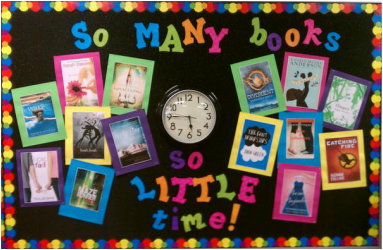 by Elaine Paliatsas-Haughey Once again in my teaching career I am seated across a school room table from the parents of a student who is struggling to read. I say, "Little Janie is reading on a third grade level in fifth grade and would really benefit by reading at home, along with the remedial instruction she is receiving here at school." They ask, "What should we have her read?" I launch into an enthusiastic list of book titles recently out for elementary age students and they are on board. I mention classics from their own childhoods, like Ramona the Brave and The Hardy Boys. Things seem to be going well and everything is falling into place until I say, "And she doesn't have to read just traditional books. She can read manga and graphic novels. Try poetry or magazines. If there is a particular website she enjoys, encourage that. She can read the cereal box out loud to you during breakfast if you want!" I see I've become too impassioned at that point. Now I've lost them. What I find in the rest of our conversation is that I lost them after traditional books. Often, because parents associate learning with only classic literary stories the idea of using almost any other form of written word to educate youngsters is foreign territory. They cannot see the value in other forms or genres.  photo from mpmschoolsupplies.com photo from mpmschoolsupplies.com This stigma has grown out of the larger writing world that sometimes divides up into factions under titles like fan fiction, literary fiction, guilty-pleasure reading, etc. There are criticisms and social media commentary battles over what counts as legitimate writing/reading material. Joshua Rothman in his article "A Better Way to Think About the Genre Debate" lays out the details of this online argument well and gives a fresh perspective. Meanwhile we ask, can fan fiction stand on the same rung as the popular fiction it is growing out of? Are manga and graphic novels equal, and is either worth using as a teaching tool? Can horror help students improve their reading if it isn't Frankenstein? The arguments go on and on. A creative and intuitive teacher knows that an array of these genres can be used to encourage struggling readers, but lots of parents are stuck on the classic literature kick. The funny thing is, according to Damien Walter in "Literature vs Genre is a Battle Where Both Sides Lose," literary fiction isn't benefiting itself in anyway by being "better" than genre fiction. In fact, by being what he calls "the artificial luxury brand," literary fiction has isolated itself and seen a drop in sales. The even funnier (and more important) thing is that kids don't care. Kids want to read stories that are interesting to them that also don't condescend to them because they are not quite at their grade reading level. Now, there are companies like Harcourt-Brace and Pearson that exclusively make educational reading materials to address the issue of below level reading. The first choice of district curriculum directors to supplement classroom reading is always educational materials from one of these big educational publishers. Unfortunately, this is not always the natural best choice. Sure they are at hand and on various reading levels, but even though they are labeled "high-interest," education jargon for "kids will like this because it's hip," what is interesting to each student is as individual as that student. Just because there are stories about skateboarding and computer coding doesn't mean that a teacher has enough to pull in every struggling student. Allowing students to read what they enjoy, within reason and coupled with grade level texts, casts a wider net that can make a reader out of the most reluctant student. One school and community resource we overlook most often when searching to match a struggling student with just the right text is the librarian. Who knows better the array of books in the library, their topics, and their reading levels than the librarian? Most teachers and parents are lucky enough to have an in-school librarian, but if not, there is always the local library, no matter how small. However, curriculum supervisors have sadly come to a place in which they keep looking for the silver bullet that will target and obliterate the problem of reading issues instead of asking the expert in our midst. All the while I keep hearing elementary school teachers crying out: just give me books! Even though I am not a fan of some of the books my students have read over the years such as The Twilight Saga and The Captain Underpants Series I do value the fact that their close excited reading has them talking about what they have read with comprehension and creating excitement in other readers. Yes, I prefer my students get wrapped up in Bud, Not Buddy by Christopher Paul Curtis or Number the Stars by Lois Lowry over Prince Fly Guy by Tedd Arnold. I don't always get that choice and neither would I want that control. The best way for me to help my students become strong independent readers is to encourage any interest in reading materials they will seek out on their own over and over again without anyone's guidance. After all, the most empowering part of reading, is that we get to choose what we like to read.
1 Comment
Vasiliki W.
9/30/2016 02:19:37 am
My middle son struggled with and hated reading but if you handed him "Captain Underpants", "Diary of A Wimpy Kid" or "Amelia Badelia"; he would read and giggle. If he struggled with a word he would ask. He only read those because he "enjoyed" them... Kids will read if they are interested in the genre... For my son it was anything comical...... GREAT Piece on this!!
Reply
Leave a Reply. |
Archives
April 2024
Categories
All
|
|
Glassworks is a publication of Rowan University's Master of Arts in Writing 260 Victoria Street • Glassboro, New Jersey 08028 glassworksmagazine@rowan.edu |
All Content on this Site (c) 2024 Glassworks
|

 RSS Feed
RSS Feed
